- Master of Engineering in Aerospace Engineering at McGill University allows students to complete this course in 1.5 years.
- Students need to complete 45 credits successfully to graduate from this program.
- There are two options to complete this program. They are thesis-based and non-thesis based or project-based.
- The Department of Engineering Studies offers M.Eng and Ph.D. programs that attract students from all over the world.
- The students to faculty ratio for this program is 17:1.
- The M.Eng in Aerospace Engineering offers advanced training in the critical, historical, and theoretical analysis of:
- Aeronautics and Space Engineering
- Avionics and Control
- Aerospace Materials and Structures
- Virtual Environment
- Computational Electromagnetics
- The research interests and facilities of the Department are very extensive, involving more than 50 faculty members
- The Department is equipped with state-of-the-art experimental laboratories and there are numerous multidisciplinary research projects, so students are provided with an ideal environment to develop new technologies, discover novel phenomena, and design revolutionary devices.
- Undertaking this program at McGill University provides students with an opportunity to conduct intensive research under the supervision of researchers who are leaders in their field.
- The job opportunities after this program that students get are:
- Aerospace engineer
- CAD technician
- Design engineer
- Higher education lecturer
- Maintenance engineer etc., with an average salary of 47,250 USD.
- The Master of Engineering degree (thesis option) involves graduate-level courses and an externally examined thesis.
- This program is research-oriented and the thesis is expected to involve a thorough examination of a topic of current interest in a research area within the Department.
- The program is ideal preparation for a Ph.D. degree or an industrial research career.
- The Master of Engineering degree (project option) involves graduate-level courses and an internally examined research project.
- The program is oriented more toward professional development than the thesis option.
- The project is of significantly less scope than a thesis and includes options such as a technical review, a design project, or a small-scale research project.
- Students are provided with a very solid background in electrical and computer engineering, both in terms of breadth across the entire field and depth in the area of specialty.
- Graduates frequently pursue careers in research and development. A part-time program is possible.
Thesis Option:
Non-thesis Option:






.jpeg?tr=h-100,w-200,c-force)







